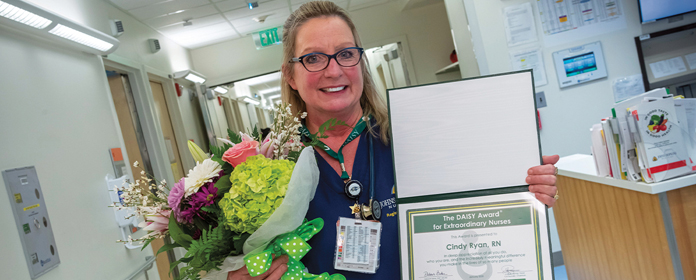Critically ill patients who experience death wishes are not necessarily asking to bring the end forward, study asserts
It is an experience that is often sporadic, or that is linked to a status that can be alleviated, according to a recent research led by the ICS of the University of Navarra.

PHOTO: Manuel Castells
"In the course of advanced disease some patients notice, and sometimes express, a wish to die. It is not always persistent, nor does it necessarily entail the intention of bringing forward the end". So says Alazne Belar, lead author of a study carried out by researchers from the ATLANTES Program of the Institute for Culture and Society (ICS) of the University of Navarra and published in the British Medical Journal Supportive and Palliative Care.
At research , 201 patients receiving palliative care were interviewed. Eighteen percent reported having had the experience of wanting to die: 11% sporadically and 7% more persistently.
The main reasons that patients associated with having this experience were, fundamentally, pain and other physical problems (33%), emotional issues (33%) and feeling a burden on the family (24%). To a lesser extent, existential or meaning issues (8%) or a poor perception of one's own dignity (2%) were associated.
Alazne Belar points out that, in the context of the disease, the experience of wanting to die "can be felt as a passing sensation or as a reality out of reach, without being accompanied by a proactive attitude of wishing to die". She comments that, in a strict sense, "they are referred to, rather, as sporadic or reactive experiences" and that the professional who wants to alleviate this status "must understand the reality of the patient and take into account the nuances in each case".
Understanding the patient to provide better careHe also points out that in the study and in the clinical internship there are also more persistent and intense experiences in which the patient expresses the desire to die: "Neither in these cases should it be assumed that the connotation of wanting to bring forward death is included". In this line, he details that in the study this nuance "was present, consistently, in three patients out of the total number of those interviewed".
We have learned that the experience of wanting to die in palliative care patients is common," says the researcher, "and that having a gentle conversation about it is not harmful for them. She therefore encourages professionals to systematically explore these experiences without fear: "It can help them to better understand the patient and provide better care.
The work website talks about the fact that the family should also address these issues, so that they see the experience of their loved ones as something normal. "It's about accompanying them in that phase of life," he adds.
reference letter from article: Belar Beitia, A., Arantzamendi Solabarrieta, M., Santesteban, Y., López Fidalgo, J.F., Martínez García, M., Lama, M., Rullán, M., Olza Moreno, I., Breeze, R.G., Centeno Cortés, C. (2020)'Cross-sectional survey of the wish to die among palliative patients in Spain: one phenomenon, different experiences to distinguish' BMJ SUPPORTIVE & PALLIATIVE CARE




